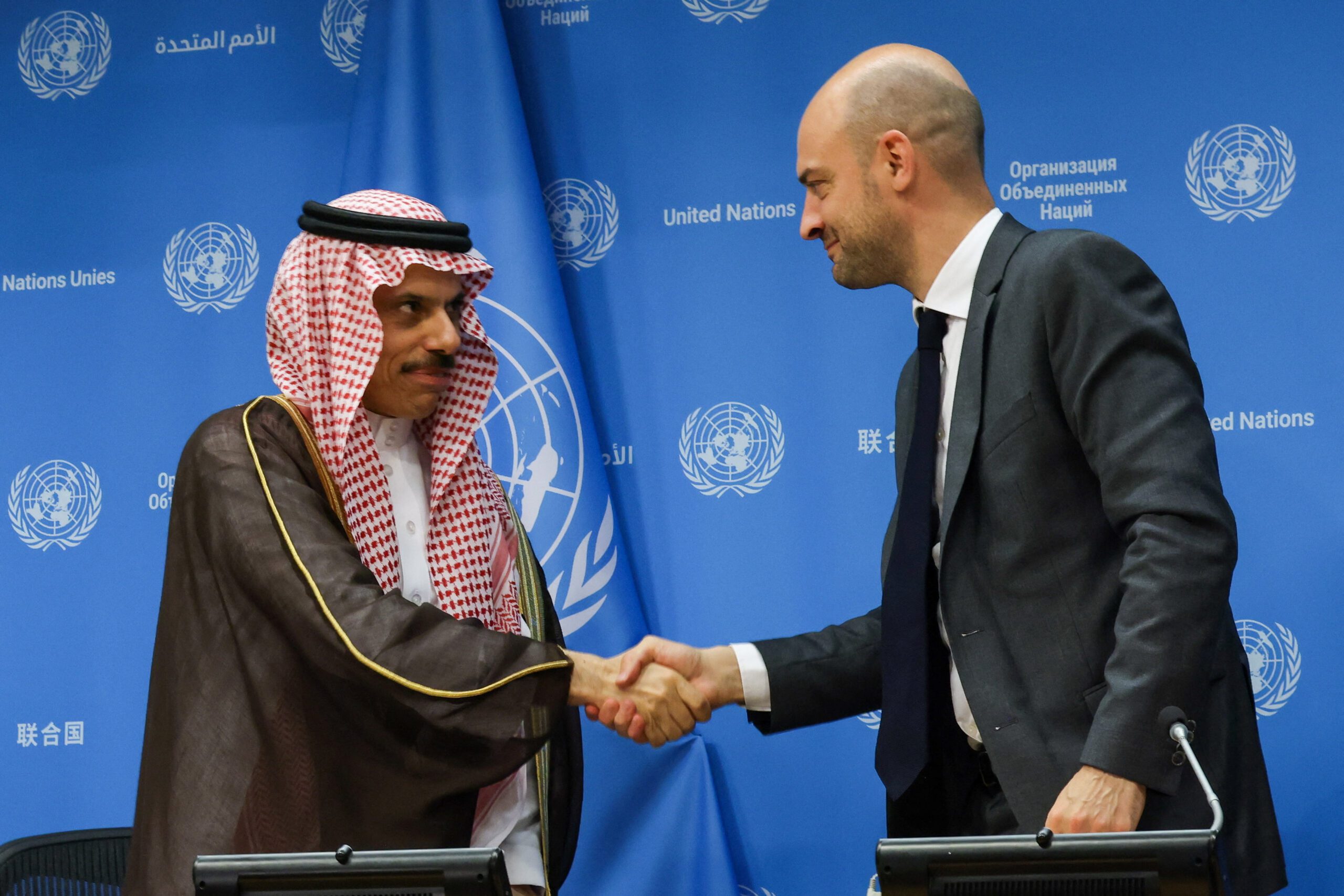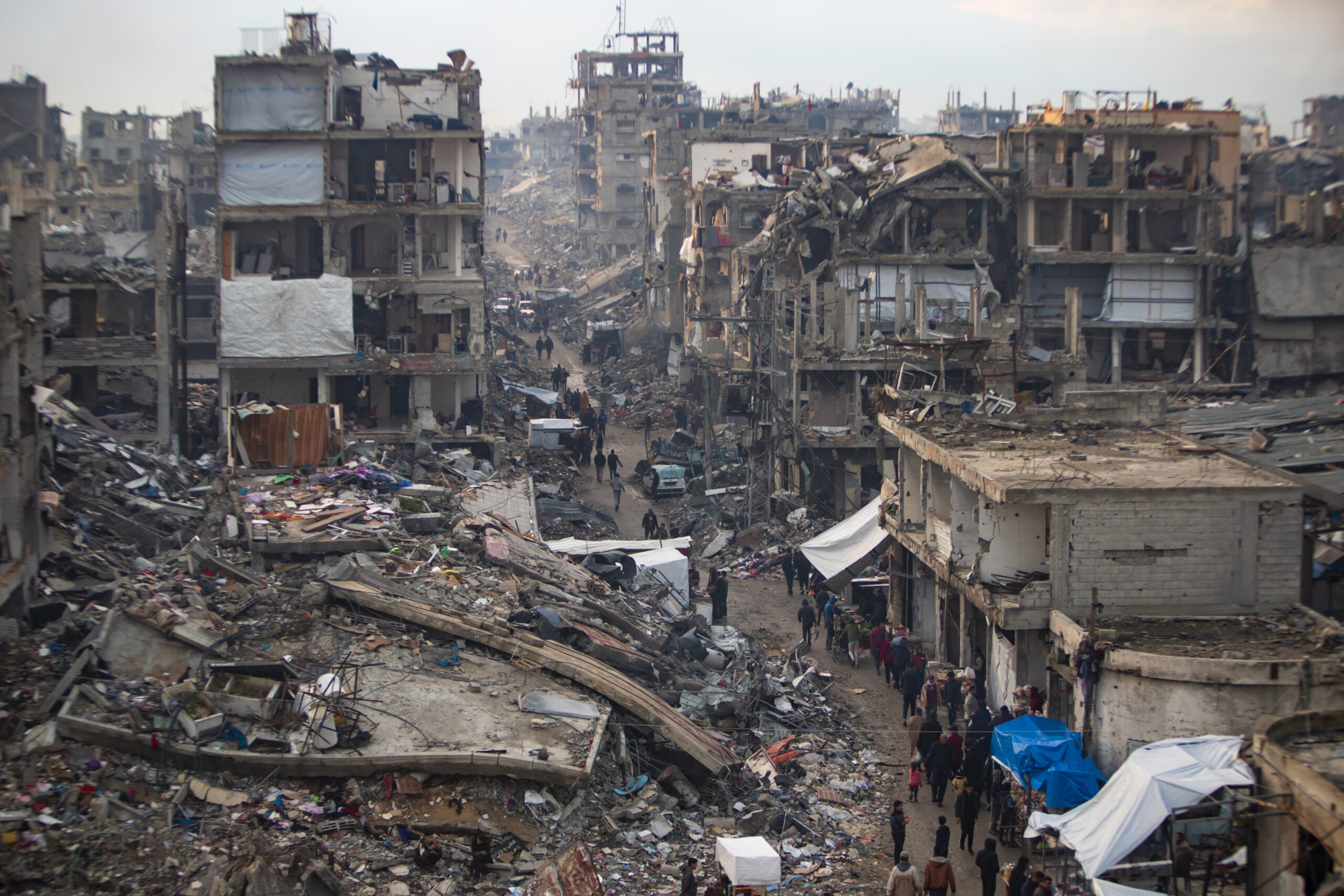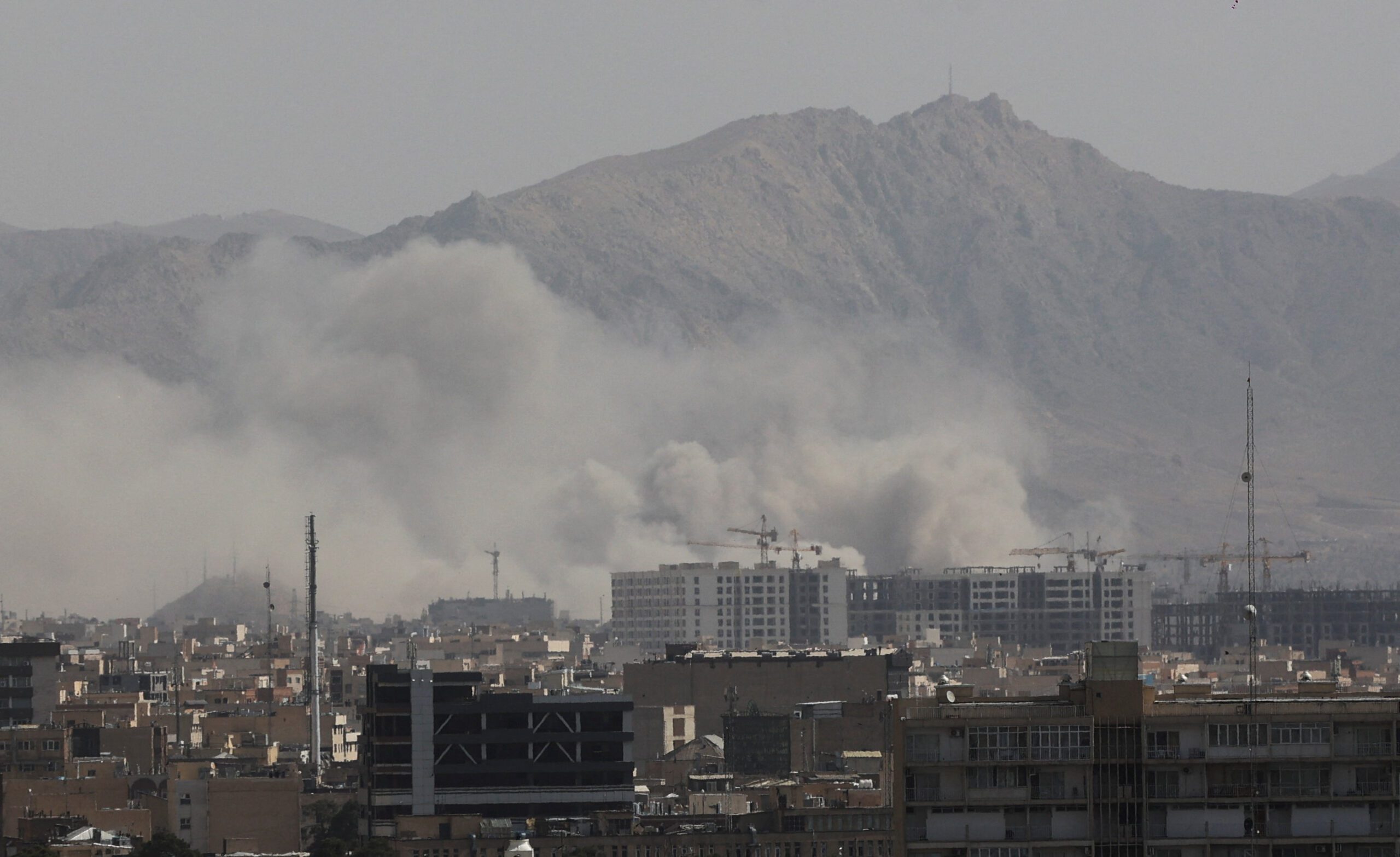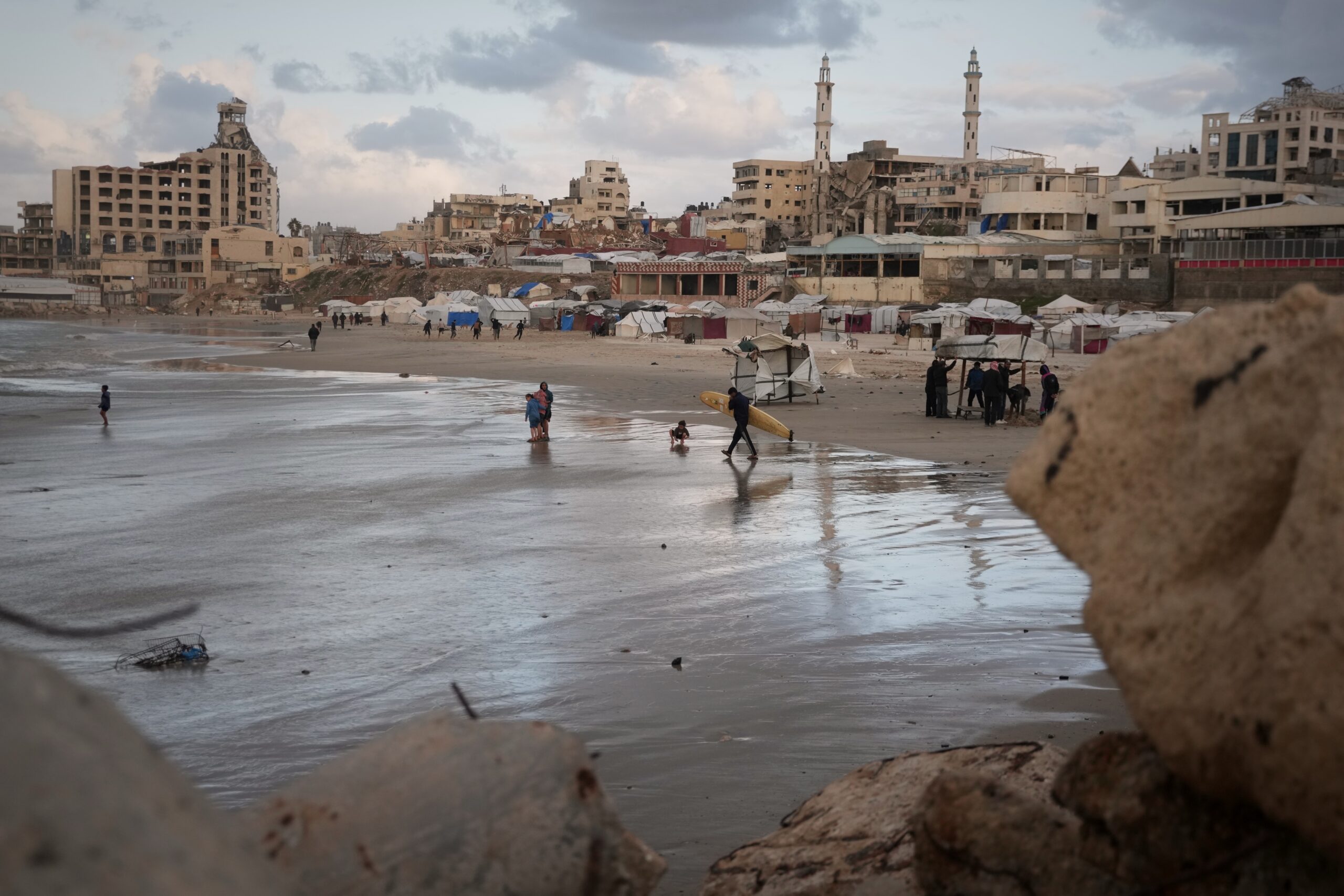Gulf States Want Nothing To Do With Netanyahu’s Arab Force
Israeli Prime Minister Benjamin Netanyahu wants “Arab forces” to eventually take over in Gaza, but Gulf countries will never accept his terms.

As Israel launches yet another offensive in Gaza, once again vowing to obliterate Hamas remnants and permanently pacify the entire territory, Israeli Prime Minister Benjamin Netanyahu has been forced to drop some hints about what he plans for postconflict realities in Gaza. They are vague and in many ways contradictory, but a key feature in these talking points is the notion of “Arab forces” as the primary guarantor of stability and law and order on the ground.
Netanyahu now says that after taking military control of all of Gaza and somehow eliminating Hamas as a political as well as military and paramilitary presence, Israel only wants to maintain “a security perimeter.” In what was, perhaps, a Freudian slip, he said the goal is to “enable the population to be free of Gaza.” He continued that, “We don’t want to govern it. We don’t want to be there as a governing body.” After destroying Hamas, Netanyahu said Israel would “hand over Gaza to a transitory government” that he has not defined. But that hinges on his professed plan to “hand it over to Arab forces that would govern it properly.” Netanyahu has also categorically ruled out any role for the Palestinian Authority, and by using the word “Arab” as opposed to “Palestinian” the Israeli prime minister certainly appears to be implying that these “forces” would come from Arab countries. There is virtually no doubt that he has Gulf Arab countries, as well as possibly Egypt and Jordan, in mind as potential participants.
But Gulf countries will certainly not contribute to any version of the arrangement Netanyahu appears to be envisaging. Only the United Arab Emirates, arguably the Arab country with the friendliest relationship with Israel, has expressed any interest in participating on the ground in postconflict stabilization. But it has been clear that it would only do so in coordination with the Palestinian Authority, which would have to issue a formal invitation for Emirati involvement and would never be drawn into “providing cover” for continued Israeli occupation in Gaza. Indeed, the UAE reportedly said it would insist on reforms within the Palestinian Authority, “an explicit commitment to the two-state solution” by Israel, and “a clear leadership role by the US.” In discussions in January with Israel and the United States, the UAE expressed some interest in participating in the provisional administration of postconflict Gaza. But an unidentified UAE official told Reuters that, “The UAE will not participate in any plan that fails to include significant reform of the Palestinian Authority, its empowerment, and the establishment of a credible roadmap toward a Palestinian state.” Jordan, too, has said that it will “only support what the Palestinians agree and decide on.” Reuters reported a Jordanian official saying “Security in Gaza must be done through legitimate Palestinian institutions,” and that Arab countries “will not be agreeing to Netanyahu’s policies nor clean his mess.” It’s hard to imagine any Arab government taking a substantially different position.
But Netanyahu’s extremist Cabinet is even more hostile to and fearful of the Palestinian Authority and its affiliated institutions – the Palestine Liberation Organization, which speaks for the Palestinian people on the world stage, and the Fatah political party, which dominates both of those governance bodies – than it is of Hamas. This may seem counterintuitive because of Hamas’ commitment to armed struggle, including killing and kidnapping Israeli civilians, as demonstrated by the October 7, 2023 attack on southern Israel, plus the organization’s goal of creating an Islamist state in all of British Mandate (“historical”) Palestine, including Israel and the occupied territories. The Palestinian Authority, the PLO, and Fatah, by contrast, remain committed to the goal of creating a small Palestinian state in the territories occupied by Israel in 1967 (further mitigated by land swaps), to be achieved through negotiations rather than violence. The Palestinian Authority, Fatah, and the PLO – in contradistinction with Hamas – uphold the recognition of Israel in 1993 by then-PLO Chairman Yasser Arafat.
Yet, in the minds of much of the current Israeli Cabinet, the Palestinian Authority, the PLO, and Fatah pose a greater threat than Hamas because, under the right circumstances, they could be the bedrock for the establishment of an independent Palestinian state in the occupied territories, mainly the West Bank. This has been their stated goal since the early 1990s. Hamas does not intend to create a small independent Palestine in the occupied territories, and if it did go along with such a plan it would be as the first stage toward what it views as the “liberation” of the entirety of Palestine, including what is now Israel.
Major Western countries, including Britain, France, Australia, and Canada, have stated their intention to recognize an independent Palestinian state in September, in effect under the leadership of the PLO – which has nonmember observer state status at the United Nations General Assembly. This illustrates the danger posed by these moderate and nonviolent Palestinian organizations that seek peaceful coexistence with Israel. To understand the degree of threat perceived by the current Israeli Cabinet, which is committed to the eventual annexation of the occupied territories and in particular most, if not all, of the West Bank, it is essential to recognize that such annexation is the overriding goal for the Israeli state from their perspective.
From the point of view of Israeli extremists, virtually everything the Israeli government does must be evaluated above all through the prism of the prime directive of annexation. For many religious Zionists, much of the West Bank has greater importance – is literally more sacrosanct – than much of the territory in what the international community generally recognizes as the legitimate Israeli state. Tel Aviv, by far the largest and most prosperous city of Israel, and in many ways the center of its economic and civic life, was built on a virtual greenfield site. There was a small Palestinian village nearby, but the area upon which the early Jewish settlers established it in 1909 was a sandy suburb of the Arab city of Jaffa (which it later came to swallow). It was originally practically unpopulated and had no particular biblical or historical significance, in contrast with the biblical and historical Jewish attachments to areas of the West Bank, such as occupied East Jerusalem, Hebron, Nablus, Jericho, and the northern West Bank “Hills of Phinehas.”
From this perspective, the “redemption” of much if not all of the West Bank is far more important than maintaining the sovereignty of the Jewish state as it is presently defined, including not just Tel Aviv but much of the Galilee, areas in and around the Negev desert, and much more. Many religious, or even historical irredentist, Zionists, and Israeli nationalists – much like Hamas – regard all of British Mandate Palestine, and in some cases far more territory than that, to be the religious and historical patrimony of the Jewish people, which is why there is a movement in Israel, including inside the Cabinet, to reestablish Israeli settlements in Gaza. Such extremists would not agree to cede control of any of the land recognized as constituting the state of Israel, and they see annexation of the West Bank as a nonnegotiable imperative for the Israeli state and the even older transnational Zionist project.
That is why the threat posed by the PLO and Palestinian Authority seeking to establish a Palestinian state based in the West Bank and other territories occupied in 1967 is viewed as even greater than that posed by Hamas. Hamas’ vision of a united Islamist-ruled Palestine is a wild fantasy, utterly lacking not just international but Arab state support. The worst Hamas can do was illustrated by the horrors inflicted on October 7. But such violence not only doesn’t interfere with the goal of Israeli annexation, it strengthens the case for it in the eyes of many Israelis who are presently being told, including by Netanyahu, that any Palestinian state would just be used as a platform for the eventual elimination of Israel.
Moreover, the armed struggle and violence preached and practiced by Hamas would provide precisely the opportunity Israeli extremists might exploit to justify annexation in the West Bank should large-scale communal mayhem erupt there. This is precisely why the most extreme ministers in the Cabinet, led by Finance Minister Bezalel Smotrich, who have been given a great deal of control over the West Bank, have been arming and inciting extremist settlers to attack and harass Palestinian villages. He is also spearheading the most strategically damaging settlement projects, particularly the long-coveted E1 area that would cut occupied East Jerusalem completely off from the rest of the West Bank and is intended to “bury” Palestinian statehood for good. Separately, under his de facto guidance, the Israeli military displaced over 40,000 Palestinians in the northern West Bank in a mere month in February, a good indication of what could happen to Palestinians if a large chunk of the West Bank were annexed to Israel under rubrics such as “extension of sovereignty” or the application of Israeli civil law in more of the occupied territories.
For this reason, the current Israeli government is, if anything, even less likely to allow the Palestinian Authority to play a significant role in postconflict governance in Gaza than it is to allow the resurgence of de facto Hamas rule there. Yet the Arab states that may evince, or in the case of the UAE already have shown, interest in supporting postconflict stabilization in Gaza, have made it clear that they will only do so in coordination with the Palestinian Authority. Netanyahu speaks of “Arab forces” as opposed to anything Palestinian, and it’s not impossible to imagine some Arab countries participating, even with boots on the ground, in a postconflict stabilization project that can allow for reconstruction and prevent the resurgence of Hamas and any repetition of the October 7 attack and Israel’s wildly disproportionate response.
But not only would they insist on Palestinian Authority involvement to lend legitimacy to such an endeavor, they would also insist on a Palestinian civil administration, which Netanyahu has carefully avoided entertaining. The stark binary in Palestinian politics between Hamas and Fatah means that any non-Hamas Palestinian civil administration in Gaza would de facto derive its authority from Fatah. Since this would strengthen the political hands of those Palestinians who want to negotiate with Israelis rather than shoot at them – but who also want to create an independent Palestinian state in the West Bank – Israeli extremists are unlikely to ever agree to such an arrangement.
This is precisely what the unnamed Jordanian official quoted by Reuters meant when he said Arab states were not willing to “clean up” Netanyahu’s “mess for him.” They will not be willing to govern Gaza without Palestinian participation. They will insist that the Palestinian Authority will have to be the de jure source of legitimacy for such a project. And they will undoubtedly tie the whole thing to explicitly strengthening and promoting the two-state solution and the quest for an independent Palestine based in the West Bank and along the lines of the territories occupied in 1967 – exactly what the Israeli extremists that dominate the current government seek to avoid.
There will, therefore, be no “Arab forces” willing to stabilize or govern Gaza for Israel, without the Palestinian Authority, or after Israel withdraws to whatever “security perimeter” Netanyahu has in mind. It is likely that the Israeli prime minister knows this perfectly well, and his rhetoric is intended to placate parts of the Israeli public, especially much of the Israeli military command, that demands to have some sense of the current mission that the new Gaza offensive is either perpetuating or initiating. Almost two years into the Gaza war, rhetoric about “eliminating Hamas” or pacifying Gaza is no longer sufficient. Netanyahu has been forced into at least offering some vague bullet points and hints about what Israel is fighting to accomplish in Gaza beyond the “mighty vengeance” that he promised the night of October 7, 2023. That, certainly, has already been achieved many times over.
Israeli generals, and thoughtful Jewish Israelis throughout the country, are increasingly asking what Israeli troops are fighting to accomplish now. What is the purpose of the major new offensive? Because this demand can no longer be ignored or waved away as premature as in the past, Netanyahu now speaks of not merely taking control of all of Gaza and eliminating Hamas but of then establishing “security perimeters” and handing governance over to mythical “Arab forces.” The bottom line is, however, that such an entity does not and isn’t going to exist. His conditions, in particular his refusal to countenance any role for the Palestinian Authority and, therefore, any non-Hamas Palestinian civil authority (which would inevitably draw its legitimacy from Ramallah), ensures that even if Arab countries, beginning with the UAE, were willing to consider contributing troops and financing to a serious postconflict stabilization project in Gaza, their minimal parameters for making such a commitment would not be met.
Israel is, therefore, still left with the fundamental choice it has had since the war began almost two years ago: reestablish an open-ended occupation throughout Gaza (thereby providing Hamas with ample targets for an insurgency that will only intensify over time), or withdraw and watch Hamas crawl out of the rubble and declare “divine victory.” Those options were distinctly unpalatable from the outset, and they have not become more appealing since. But this remains the trap in which Israel has enmeshed itself and no fanciful “Arab forces” or other imaginary deus ex machina exist or are likely to emerge.
The views represented herein are the author's or speaker's own and do not necessarily reflect the views of AGSI, its staff, or its board of directors.






























